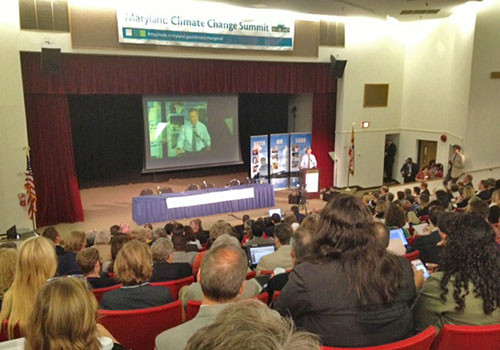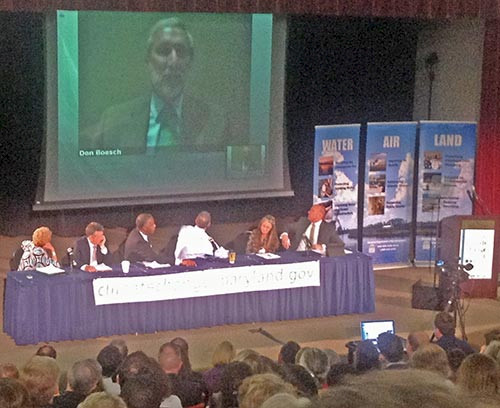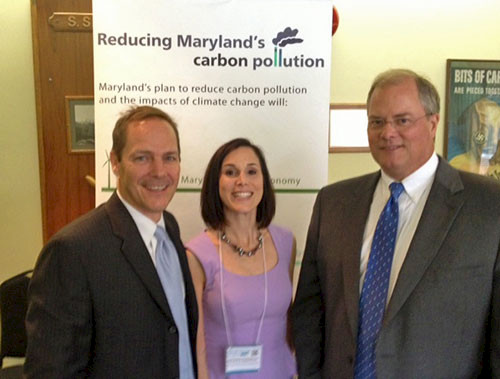Maryland Climate Change Summit
Bill Dennison · | Environmental Literacy | Science Communication |Several hundred people gathered at the Maritime Institute conference facility in Baltimore for the Maryland Climate Change Summit on July 25. The Summit was kicked off with a talk by Governor Martin O'Malley to a standing room only audience. Governor O'Malley likened climate change to gravity--physics, pure and simple but also acknowledged that the response was complex. He spoke of the 'fierce urgency of now' and moral obligation of addressing climate change issues. He emphasized the economic benefits of creating green jobs, obtaining better results as a result of better choices, unleashing the entrepreneurial spirit and innovation potential of Maryland citizens, and using the education leadership in Maryland to create climate literacy. Governor O'Malley also touched on the vulnerability of Maryland, developing adaptation strategies, and the opportunity to provide leadership nationally and globally. His speech included a lot of facts and figures regarding climate initiatives, but it was his passion for the topic that led to a long standing ovation at the conclusion.

Governor O'Malley next chaired a panel discussion with a diversity of interesting speakers. The panel included UMCES President Don Boesch, who was skyped into the Summit from New Orleans where he was involved with a National Academy of Sciences meeting. Don emphasized the urgency of the challenge, the importance of education initiatives like the MADE CLEAR climate literacy program, and mentioned that climate science was more than just physics--it includes science, technology, engineering and math (STEM). Fred Mason from the AFL/CIO talked about his childhood on the Delmarva peninsula where sea level rise is marked and visible, and about the importance of integrating climate responses with economic development. Margo Bailey, long serving Mayor of Chestertown, talked about their initiatives to create rain gardens and barrels, bike lanes, farmers markets and ban plastic grocery bags. Scott Wiater, CEO of Standard Solar, talked about the business side of renewable energy and indicated that a three-pronged approach to energy was the following: 1) developing a mix of energy sources, 2) reducing consumption, and 3) creating new innovations. Dr. Cindy Parker, a physician, talked about the importance of keeping people healthy, rather than treating sick people. She also emphasized the vulnerable segments of the population that are adversely affected by climate factors; in particularly, young and elderly people, chronically ill people and poor people. She concluded with the positive feedbacks that occur with creating better air quality--both direct health benefits and indirect benefits via climate change amelioration. Mike Tidwell from the Chesapeake Climate Action Network took off time from his walk across Maryland from Camp David to the White House in support of President Obama's climate initiatives. Mike called the Governor a "Climate Superhero" and talked about the need to fight "dangerous new sources" like "reckless fracking and tar sands".

The Summit also included lunch speakers, Vicki Arroyo from Georgetown Climate who talked about the need to "learn by doing, with an emphasis on doing" regarding climate adaptation and Tom Peterson who talked about the future "carbonized economy". There were break-out sessions in the afternoon to continue the dialog about climate from a variety of perspectives and I was impressed at the willingness of people to contribute to these sessions.
The Integration and Application Network staff contributed significantly to the event, starting with the production of the Maryland Greenhouse Gas Reduction Plan Executive Summary, working closely with the Maryland Department of Environment. In addition, the new Climate Change Maryland website created by IAN's Adrian Jones was launched in association with the Summit. The posters and signage also used the IAN design and layout developed for the Plan by Tracey Saxby. IAN folks, particularly Caroline Wicks, Alex Fries and Heath Kelsey worked on the plan as well as helping videotape the conference and populate the website. IAN staff worked closely with MDE staff, in particular, Bob Summers, David Costello, Kathy Kinsey, Tad Aburn, Brian Hug, and Samantha Kappalman. It was gratifying to see the results of the IAN activities front and center for such an important topic at such a public venue.

About the author
Bill Dennison

Dr. Bill Dennison is a Professor of Marine Science and Vice President for Science Application at the University of Maryland Center for Environmental Science.